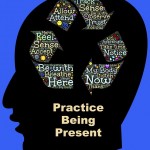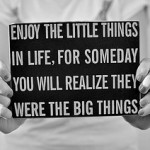Over the past two months, I’ve been thinking about education from a completely different angle: The angle of a new mom. My daughter was born in late June, so my husband and I have been carefully searching for the perfect childcare environment to protect and amuse our daughter when I return to work in September. This responsibility made me feel overwhelmed and paralyzed. As a teacher, I have eyes for every single safety hazard and ears for every little educational detail. Rest assured, we found the perfect environment after an arduous search. But the lengthy task provided much time for thinking and reflection. Amidst the many tours and conversations, I found myself thinking a lot about accountability.
When it comes to accountability, I absolutely believe that teachers should care about students and track their progress. However, the rhetoric about accountability is more like a disease that cannibalizes other conversation topics, like the well-being and emotional health of kids. As I toured childcare facilities, some directors went on and on about rigor, assessment, and DATA! They talked about how teachers would be carefully tracking my daughter’s progress, following a fancy curriculum, taking pictures of her learning, and uploading them to their data reporting system so I could log in and see her progress. Data, data, DATA!!!! You know what I wanted to know about? I wanted to know if they would hug her, protect her, sing to her, read books, and make funny faces. I wanted to know about their art projects, family communication, and safety practices. All the talk about rigor and accountability made me yawn.
As an early childhood educator, I often feel suffocated by the assessment practices in our state. Preschool teachers are required to keep online portfolios for each student in a program called Teaching Strategies GOLD. Though I strongly believe in old-school portfolios (a collection of student work in a folder to reference for planning and assessment), I struggle each year to make the online portfolios meaningful to me as an educator. I work hard to feed the “data beast” with the required number of entries for each student. Sometimes, I find myself taking photos, recording video, and logging data while I would rather be interacting with kids to facilitate learning. I watch my wonderful Educational Assistants playing with my students while I observe through the camera of the ipad—recording the precious data so the state can see that I’m doing my job as a teacher. I’ll be brutally honest: I hate it. I hate it when I have to feed the data beast instead of spending time with my students. I was a better teacher when I was allowed to track student progress through real-life student portfolios that enhanced my reflective planning and supported my family conferences. It gave me a lot more time with kids and much more authentic data. Online GOLD portfolios cramp my style.
So, as the childcare directors went on and on about rigor, assessment, and data collection—what I really wanted to say is: Just play with my daughter. Smile at her and sing songs. Get messy. Tell me about it casually when I pick her up or stop in for a conference. I don’t want you stuck behind a computer entering pictures so that I know you’re doing your job. Can I just give you permission to skip the accountability stuff?
We saw lots of fancy facilities that promised to be experts in child development. Some were as high as $262 weekly! As we considered the cost and I grieved the idea of leaving her anywhere, I thought a lot about teacher pay as well. I’ve heard people argue that teacher attrition is related to women who get teaching degrees in college because they plan to become stay at home moms someday. I argue that this might not actually be a “grand plan,” but a circumstantial decision once teachers have children. The cost of childcare—compared to the actual salary of a teacher—is mind blowing. When we realized that childcare would cost between $800-1100 a month, I started thinking that taking care of her myself sounded pretty good. Spending half my paycheck on childcare seems a little insane! I thought creatively about selling a car and making other tough decisions so I could stay home with her. If I didn’t absolutely LOVE my job, the final decision would have been a no-brainer.
In the long run, we didn’t choose the most expensive childcare facility, the one with the fanciest curriculum, or the one with the most rigorous assessments. Instead, I witnessed a special moment and knew I had found the right place: As I was talking with one of the teachers, THREE little babies crawled all the way across the room to be near her. It was like she was a child whisperer! The first one crawled to her feet and reached to be picked up. She picked him up and another little guy crawled over, pulled up to a standing position, and gazed at her with desire. Her arms were full, so she sat down on the floor to snuggle both the boys. About that time, another little girl peered at her and started making her way across the room. Assess THAT! What a beautiful little moment. I knew I had found my daughter’s childcare facility because I saw LOVE there. It wasn’t about fancy anything or rigorous accountability. It was about good old-fashioned L-O-V-E. And I think that love is something that all educators should be talking more about these days. Rigorous LOVE!










Comments 11
Jess, what a heartfelt way to express what I’ll bet so many parents who teach have experienced. After spending so many years in a school setting, I think we quickly get a “feel” for an educational environment. I vividly remember choosing the right preschool for my daughter. No hugs, no warmth, no love = no thank you!
As a fellow early childhood educator (K) this hit very close to home! I too get wrapped up in the assessment, accountability and the rigor of it all. Though I am proud of the gains my students make and the progress that happens, I know that my job is about more than that. My line of work includes laughing at my students’ jokes, laying on my stomach building puzzles, and putting on puppet shows, to name a few things. The love I pour into my students can’t be quantified but I know parents appreciate it/expect it. Thank you for bringing this to light and the importance of rigorous love!
A close friend was recently lamenting that her very imaginative 5-year old had missed the K cut off this year. I told her that it was an amazing blessing for her gifted daughter to have another year to play dress up and tell stories in preschool. Kindergarten has changed so much in response to policy changes these recent years since NCLB. It’s truly sad how much data/accountability and non-developmentally appropriate practices are shoved toward kinder teachers. But kinder teachers magically transform as much as they can into FUN for their lucky students. BRAVO!
It was many moons ago that I saw teachers through a parent’s eyes, preNCLB in fact. And I don’t remember anything about how the kids’ progress would be so relentlessly trackedby the Data Beast. But I remember specific times that their teachers reached out to us over concerns or to share some good words. I heard, and actually took advantage of the free trial (just to see) of a service that would send parents of preschoolers sample test questions so they be prepared to get into the high end private school their parents really wanted. It really was as absurd as it sounds.
LOL, Sandy! I would love to have seen those questions!!!
What a beautiful blog written from a new perspective…a new mom! I had to giggle when I thought about an infant and accountability. Seriously…babies and toddlers need to be read to, need to be nurtured, need to discover, need to play. I am not an early childhood expert but I can say that I would want me child in the place you described as your final choice. Let a child’s life be filled with wonder, love, and discovery and they will be just fine.
Completely agree! I was amazed to see how much accountability has trickled down into the youngest classrooms! It really showed me how much national dialogue and policy affect all educators.
Oh my, Jess….this piece is amazing. You will be a wonderful mother (I’m sure you already are!) I love that you connected all of the pieces: motherhood with teaching, attention to our own children with attention to our students. I hope you enjoy motherhood as much as I have! And I hope you continue to make the rich connections that exist between parenting and teaching.
Thanks! I already feel like I understand my classroom families so much better than I did–the fierce way that some parents treat me when they first enroll their child (often at 3 years old). I totally understand the fear and hesitancy in a different way. Instead of worrying about why they don’t “trust” me in the beginning–a stranger who is about to be charged with the safety of their child–I think I will respect their healthy fear of leaving their little one in a new place More than ever, I can see that relationships with families are the key to success and comfort for all.
More than ever, I can see that relationships with families are the key to success and comfort for all.
This is a great piece– I can tell it is one of those you must have been ruminating for some time. I believe child care is the most important underexplored issue in America today. So crucial, so underpaid, so susceptible to changing market demands (i.e. accountability, parent communication of your child’s progress, etc.) So expensive. Our family breathed a sigh when my kids finally started school, but even before and after school care is a huge challenge and expense at times. I have felt ridiculously grateful when we have found safe, loving programs at an affordable price. And then I guiltily think about what those workers are getting paid and… wow.
Great points! About five years ago, daycare licensing rates drastically increased in Arizona. If I remember correctly, AZ switched to a flat price for a daycare license instead of a price that is based on student enrollment. It was the same time that AZ ended the Early Childhood Block Grant that used to provide money for early childhood education. At the time, I was working in Pendergast Elementary School District and the loss of the grant caused the district to close their (awesome) regular education preschool programs. I think that it has similar effects in other districts. I went down to the capital for a rally at the time and met many small daycare operators who said that the change in daycare licensing fees would put them out of business. I haven’t been closely following these issues over the past five years, but I thought about them a lot this summer when I saw daycare rates. I wondered if the raise in daycare licensing fees has simply been passed on to the families who need safe places for their kids. Or worse, daycare options like small home care businesses can no longer afford to be state licensed and so they don’t apply and may not keep up with important safety practices like CPR/First Aid and home inspections for dangerous situations. You are right that I’ve been ruminating about it a lot. I expected to find multiple places that were safe and affordable–instead I found one awesome place where I am finally comfortable leaving her. Thank God for them!